News Release
Enshu Beikoku Corporation Opens New Rice Mill
January 18, 2012
January 18, 2012
Enshu Beikoku Corporation Opens New Rice Mill
"Everything is open to the Public"
In 2010, Enshu Beikoku Corporation finished construction on a new rice mill equipped with the latest rice milling machines. In an effort to foster peace of mind for their customers, the mill has held tours of the rice mill open to the public.
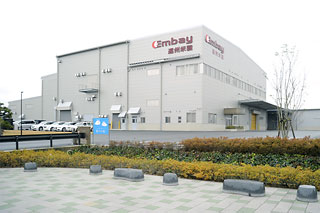 |
| The new rice mill also handles head office functions |
Building the rice mill
Enshu Beikoku is the biggest rice mill in Shizuoka Prefecture which distributes brown rice. Mr. Noboru Suzuki, the President of Enshu Beikoku, is always looking to establish new competitive advantages, to build on the company so that it may prosper in Shizuoka Prefecture now and in the future.
Mr. Suzuki and his staff considered many different approaches when designing the new rice mill, but all members of staff desired to build a "rice mill that the public can see." As a rice distributor who sells their rice to rice retailers, Enshu Beikoku has little chance to communicate directly with consumers. But when the Mr. Suzuki considers the company's future, he believes that it is necessary to establish a direct relationship with its consumers through positive communication. The new rice mill was intended to serve as a tool for establishing relationships with consumers, and so Mr. Suzuki and his staff drew up a blueprint of the plant that maximizes safety, reliability and openness.
A New System reduces damage to rice kernels and prevents contamination.
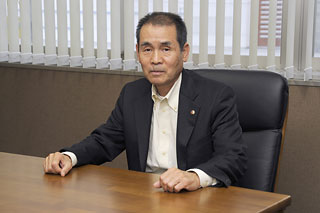 |
| Mr. Noboru Suzuki, President of Enshu Beikoku Corporation |
While making their plans for the new mill, Enshu Beikoku visited Satake's Hiroshima Head Office and observed the "Universal Transport System" in action and decided to install it in the new mill. Traditional rice mills commonly use various conveying devices to transport grain. The new "Universal Transport System" carries rice one container at a time. Because the lid on the container is closed during transportation, this system applies the least impact to rice and minimizes the chance of the rice being contaminated with impurities. Milled rice can be delivered to a rice cooking plant safely, smoothly and on schedule in the same manner as it is conveyed around the rice mill. Even though the Universal Transport System has not yet been widely adopted, Enshu Beikoku decided to base its new mill on it. When asked about the choice, Mr. Suzuki said, "We made a good decision."
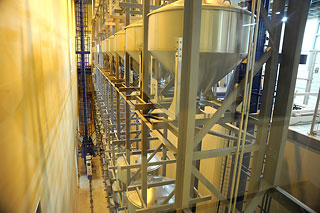 |
| Universal Transport System as seen from visitors aisle |
Enshu Beikoku decided to consign the whole project, from design to construction, to Satake. Satake introduced a new design concept to their new rice mill. All key machines, including rice milling machines and optical sorters, are located in the same floor as the control room and can be observed from there. There are 3 lines of rice milling machines with throughput ratings of 2, 3, and 4 tons per hour that can mill small amounts of various rice varieties. Each machine is positioned to maximize accessibility and maintainability. The end result is a rice mill with a design that is very different from those designed by other engineering companies.
Rice Mill Tours Earn Good Reputation
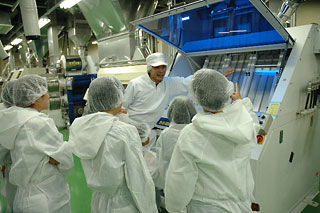 |
| Many visitors tour the rice mill |
One important goal after the completion of the new rice mill was building a bridge between producers and consumers. Mr. Suzuki and his staff developed and executed various plans to accomplish this.
First of all, they planned tours of the rice mill. The first rice mill tour was held in the Fall of 2010. Tours were held again in March and November of 2011. About 1,000 people joined the plant tour that was held in November 2011. The visitors admired the hygienic conditions of the rice mill. Mr. Suzuki was surprised by the strong response to the tours. Mr. Kei Itoh, Mill Manager, was less surprised, saying, "I know that young mothers always think of their children." He feels that food safety consciousness of consumers has increased following the earthquake of March 2011.
Enshu Beikoku has set its sights not only on consumers of rice, but on its producers. They have invited many rice farmers and their families to come tour the rice mill. Enshu Beikoku purchases rice from 80 different farmers, many of whom have farms with more than 50ha of crops. The rice producers were invited on the tour with the aim of increasing their desire to sell rice to Enshu Beikoku. Mr. Takashi Aoki, Director, says "We do not think the price is the key factor in the transaction." Enshu Beikoku has been building relationships with rice farmers for 15 years because they believe that maintaining a relationship with their farmers is essential to the success of the company. They consider this to be especially true in Shizuoka prefecture, where locally harvested rice is very popular. Enshu Beikoku considers it a great achievement that they are able to welcome their farmers and their families to their new mill.
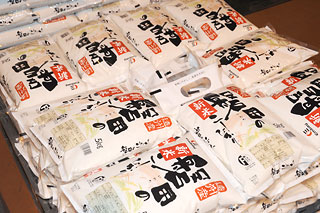 |
| "Local Brand Rice" by Enshu Beikoku |
A Bridge Between Consumers and Producers
Presently, rice is the primary product of Enshu Beikoku that ties consumers and producers together. But Mr. Suzuki has a vision to deal in agricultural products other than rice in the future. "For instance, we could sell vegetables to participants of the rice mill tour." His idea is to use the new rice mill as a bridge between consumers and producers, taking advantage of the fact that they are firmly embedded in the community.
"A rice mill can have multiple functions." It is not only a place to mill rice, but also a place where people can communicate.
* Please note descriptions in news releases are accurate as of the date of release and may differ from the most up-to-date information.
